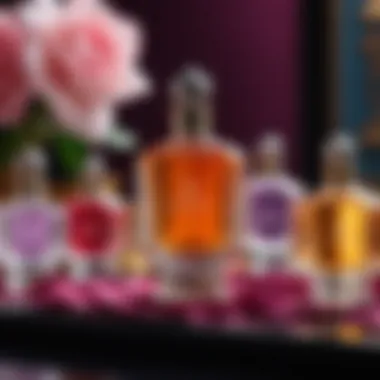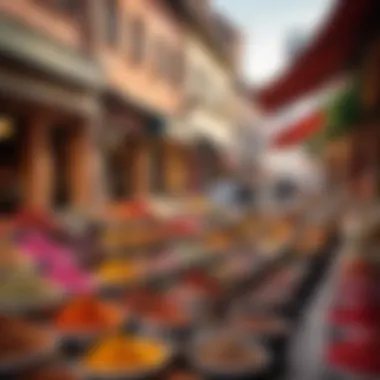Eastern Fragrance for Women: Essence and Significance


Intro
The realm of eastern fragrances is as diverse as the cultures that birthed them. From delicate florals to deep, resinous notes, the fragrances crafted in the East tell stories of ancient traditions and contemporary innovation. For many women, choosing an eastern perfume is not just about the scent; it’s about connecting with a rich history that shapes their identity and allows them to express their individuality.
As we delve into this exploration, we will cover the historical origins of these perfumes, their unique characteristics, and the role they play in various cultural contexts. Furthermore, we will look at some of the most commonly used notes that define eastern fragrances, their psychological effects, and why they continue to be a sought-after choice among women today.
By the end of this article, readers will have a thorough understanding of what makes eastern fragrances special and how to select the perfect scent that resonates with their personal style and lifestyle.
Популярные акции и предложения
When it comes to investing in fragrances, especially those that are deeply rooted in cultural significance, savvy shoppers often look for deals and promotions. Here’s a quick overview:
Обзор текущих скидок на косметические бренды
Many reputable cosmetic brands offer seasonal discounts and limited-time promotions, especially on eastern fragrances. Visiting store websites or subscribing to newsletters can lead to opportunities to snag your favorite perfumes at a fraction of their usual price. Retailers such as Sephora and Nordstrom frequently have clearances or exclusive deals on these renowned scents.
Сезонные распродажи и специальные предложения
Don't overlook the power of seasonal sales. Times like spring and holiday periods often bring about enticing promotions. Brands like Aoex, Amouage, and Serge Lutens may have special collections or discounts that come around just as the seasons change, allowing fragrance enthusiasts to refresh their collections at appealing prices.
Рекомендации по выбору косметики
Choosing the right fragrance can feel like hunting for a needle in a haystack, especially with the myriad of options out there. Here’s how to ensure you find one that fits just right:
Как выбрать косметические средства по типу кожи
- Know your skin type: Different skin types can affect how a fragrance lasts. Oily skin tends to hold scents longer, while dry skin may require more frequent applications.
- Test before purchasing: Always try a sample or a tester. Apply the fragrance to your skin and see how it interacts. You may find that a scent you liked in the bottle smells completely different on you.
Советы по выбору косметики для разных возрастных групп
- Younger women might gravitate towards light, fresh scents with fruity or floral notes, such as jasmine or bergamot, which offer a youthful, vibrant appeal.
- Older women may prefer deeper, more robust scents that convey sophistication and elegance, such as oud or amber.
"Finding a fragrance is like peeling an onion. The more layers you explore, the more you discover about your own preferences."
As we move forward, the article will dive deeper into the note profiles and cultural significance of eastern fragrances, guiding you through this aromatic journey.
Understanding Eastern Fragrance
Eastern fragrances hold a profound significance that transcends mere scent. They represent an intersection of culture, history, and personal expression. In the chase for a fragrance, one does not simply select a smell; rather, they embark on a journey steeped in tradition and emotion. The intricate dance of notes that comprise these fragrances speaks to the very essence of femininity, inviting the wearer to explore different facets of their identity.
One of the most compelling elements of eastern fragrances is their diverse cultural foundations. Each fragrance narrates a story, often rooted deeply within the local customs and practices of the regions from which they spring. Women are not just wearing a scent; they are adorned in a tapestry of heritage that whispers tales of celebration, spirituality, and communal rites.
Cultural Foundations
The cultural foundations of eastern fragrance are intricately woven into the daily lives and rituals of many societies. For instance, in places like India, fragrance plays a crucial role in ceremonies—essential oils and incense are often used to purify spaces and invoke a sense of calm. Jasmine and sandalwood, prominent in Indian perfumes, are not merely ingredients but symbols of love and devotion, connecting wearers to their heritage.
In the Middle East, blending is an art. Perfumes are crafted with the same finesse as traditional cuisine, making use of rich spices, resins, and flowers. Here, one can find oud—a precious wood noted for its rich, complex aroma—integrating the art of scent with cultural identity. This tradition, steeped in generational knowledge, imparts a sense of belonging and pride.
Moreover, various oriental scents often reflect specific elements of nature such as the earth’s warmth, the ocean’s chill, or the floral blossoms of spring. These connections create a deeper emotional resonance as the fragrance is intertwined with spiritual beliefs and natural surroundings, making them significantly more appealing.
Historical Context
When we delve into the historical context of eastern fragrances, we observe a timeline that is rich and multifaceted. The use of perfumery can be traced back thousands of years, with ancient civilizations like the Egyptians, Persians, and Chinese all contributing to this intricate craft. In ancient Egypt, for example, fragrance was not solely a luxury, but also a part of religious practices. It is said that Cleopatra would have her courtiers bathe in rosewater and wear perfumes as an appeal to the senses of her illustrious guests.
Similarly, during the Silk Road era, scents were traded as prized treasures. The exchange of perfume ingredients between the East and West influenced fragrance composition and broadening the appreciation for aromas. This cultural melting pot allowed for the development of unique blends, integrating various methods and materials that have influenced modern eastern fragrance.
There’s also a sense of modernity that cannot be ignored. In today’s world, these fragrances have morphed to adapt to contemporary sensibilities while still holding onto their historical roots. Women and men of all ages desire an authentic connection to their fragrances, seeking those which mirror their personality or aspirations. In this light, understanding the history behind the fragrance you wear can transform an ordinary ritual into a powerful statement of personal identity and cultural appreciation.
"Perfumes communicate who you are without saying a word."
The act of wearing an eastern fragrance encapsulates the beauty of its origins, embodying cultural significance and historical richness. This understanding transforms the mundane into the extraordinary, inviting a deeper connection between the fragrance and its wearer, instilling a sense of pride and identity that is as timeless as the scents themselves.
Distinctive Features of Eastern Fragrances
Eastern fragrances are like a rich tapestry, beautifully woven with threads of culture, history, and nature. Understanding their distinctive features is essential to appreciate the art and science behind these scents. From their unique ingredients to the structure of their scents, each aspect plays a vital role in creating a fragrance that resonates deeply with wearers.
Core Ingredients
Resins and Balsams
Resins and balsams are the unsung heroes in the realm of Eastern fragrances. These natural materials often play a significant role in providing depth and longevity to perfumes. Take frankincense for instance; it has a long-standing history in spiritual and medicinal practices, particularly in the Middle East. Its deep, woody aroma is not just appealing but also said to promote relaxation and peace of mind.


The key characteristic of these resins is their ability to add a warmth that envelops the senses. This makes them a popular feature in Eastern perfumes where depth and complexity are sought after. The unique feature of resins is their capacity to evolve over time. As they age, many balsams become richer, enhancing their aromatic profile. However, the disadvantages can include their sensitivity to heat and light, which may degrade their quality if not stored properly.
Spices and Herbs
Spices and herbs are another crucial element in the crafting of Eastern fragrances. They introduce an invigorating and exotic note that often tells a story intrinsic to the regions they originate from. Cardamom, for instance, is famous for its warm, spicy scent and is frequently found in Middle Eastern perfumes. This ingredient isn't just an aromatic enhancer; it also stands as a symbol of luxury and sophistication.
The major appeal of incorporating spices and herbs lies in their ability to evoke nostalgia and memories. They transport the wearer to bustling markets and serene gardens, enhancing the emotional connection to the scent. However, it’s worth noting that excessive use of strong spices can overwhelm the fragrance if not balanced delicately.
Floral Notes
Floral notes bring a romantic and enchanting quality to Eastern fragrances. Jasmine, known for its sweet and intoxicating scent, holds a revered place in perfumery. Often associated with femininity and grace, it can turn a simple fragrance into an experience of elegance.
Floral notes are beneficial because they add lightness and freshness, creating a delightful tension against the heavier spices and resins. Their unique feature is how they can transform with temperature and skin chemistry, bringing out different facets throughout the day. A downside, however, might be their inclination to fade more quickly than heavier notes, requiring thoughtful layering with other elements to maintain their prominence.
Scent Structure
Top Notes
The first impression of a fragrance comes from its top notes, fleeting but essential. Typically, these are brighter and lighter elements that grab attention. Citrus notes like bergamot and lemon are popular choices, lending an uplifting vibrancy.
Top notes can be likened to the opening credits of a movie; they set the stage for what's to follow. Their lightness makes them a popular aspect as they invite the wearer into the deeper complexities that lie beneath. The downside, however, is that they evaporate quickly, signaling the need for additional layers to support the fragrance.
Middle Notes
As the fragrance develops, the middle notes emerge, often described as the heart of the perfume. These notes can range from rosy, warm florals to spicy or herbal elements. They typically represent the fragrance's depth and body while creating emotional resonance. They help bridge the top and base notes, creating a balanced experience.
The key characteristic of middle notes is their ability to linger longer than top notes, offering a sustained experience. They are essential for a fragrance’s character and identity. However, if poorly balanced, middle notes can clash or overpower the delicate nature of top notes, leading to an uneven scent experience.
Base Notes
Last but not least, we have the base notes. These form the foundation of any fragrance, providing durability and richness. Ingredients like sandalwood, vanilla, or amber often serve as base notes. Their deep, warm characteristics are what keep a fragrance anchored long after the initial top notes have faded away.
Base notes are beneficial for their lasting power; they can linger on the skin for hours, sometimes even days. The unique feature of base notes is their ability to deepen and evolve over time, similar to a fine wine maturing with age. However, they also run the risk of dominating a fragrance if not harmonized properly with the other layers.
The Allure of Eastern Fragrances
The world of eastern fragrances has an enchanting quality that makes it stand out in the vast ocean of scents. These fragrances are not just about the aromas they emit; they carry deep emotional and cultural connections that resonate with many. The allure lies in their ability to evoke feelings, create memories, and symbolize significant concepts, all while staying rooted in rich traditions. This article explores how emotional resonance and cultural significance play pivotal roles in the appeal of these fragrances for women.
Emotional Resonance
Evoking Memories
Every fragrance has a story to tell, and when it comes to eastern perfumes, they often bring forth memories like an old friend. The act of smelling a specific scent can transport individuals back to a childhood moment, perhaps the scent of sandalwood reminiscent of a grandparent's home. This connection is a powerful aspect of fragrance; it shapes our experiences and emotions, making us feel anchored in a certain time or place.
The key characteristic of this memory-triggering feature is that scents are closely linked to the brain's emotional center. Thus, something as delicate as a floral note or a hint of musk can spark joy or nostalgia. This isn't just beneficial—it's nearly universal among people. The unique feature of scent memory is its profound ability to connect people with their past, creating a sense of belonging. In a fast-paced world, these fragrances serve as a comforting reminder of simpler times.
Symbolic Meanings
Beyond the personal narrative, fragrances also carry symbolic meanings rooted in numerous cultures. For instance, jasmine is often seen as a symbol of love and purity, revered across different societies. This aspect of fragrance lends itself to a broader understanding of how scents define emotional states and cultural beliefs.
The key characteristic here is that symbolic meanings enrich our appreciation of fragrances, making them more than just pleasant aromas. They become a language through which feelings and values are expressed. The unique feature of these symbolic connections is how they foster cultural appreciation and deepen consumer engagement. In this sense, choosing a fragrance is also about embracing a particular ethos or tradition, making it a deeply personal choice.
Cultural Significance
Traditional Practices
Eastern fragrances often arise from time-honored customs, stemming from spiritual or healing practices that have withstood the test of time. Many cultures incorporate fragrance into daily rituals, such as burning incense or applying essential oils for religious ceremonies. The deep-rooted nature of these traditional practices illustrates how important fragrance is to cultural identity.
The key characteristic of this traditional aspect is that these practices teach us about interconnectedness—between humanity and nature, as well as among different cultures. The unique feature here is the way these traditions are often passed down through generations, allowing modern users to participate in an age-old ritual, providing a sense of continuity and history. For the modern consumer, this connection can add value and depth to their choice in fragrance.
Modern Adaptations
As society evolves, so too do the practices that surround fragrance. Modern adaptations blend classical techniques with contemporary influences, such as the rise of niche perfume brands that focus on artisanal, small-batch creations. This shift highlights how eastern fragrances adapt while maintaining core principles.
The key characteristic of these adaptations is their focus on personal expression rather than mass-market appeal, catering to women and men alike who seek unique scents that reflect their identity. The unique feature of this evolution is the balance between honoring tradition and embracing innovation in fragrance formulation. However, it can sometimes lead to a disconnect from cultural origins, making it vital for brands to educate consumers about the backgrounds of their scents.
"Fragrance, in all its nuances, serves as a bridge connecting past traditions with modern expressions, allowing wearers to embody the essence of different cultures while charting their own course."
In summary, the allure of eastern fragrances is deeply entwined with emotional bonds and cultural narratives that characterize their essence. These scents harness powerful connections between our memories, symbols, and traditions, making them a rich subject for exploration. As readers delve into this fragrant world, they become interwoven in a tapestry of history, emotion, and culture that transcends the mere act of wearing perfume.
Psychology of Fragrance Choices


Fragrance isn’t just a pleasant aroma; it serves as a powerful tool in understanding human emotions and self-identity. When it comes to eastern fragrances, this connection becomes even more significant. The profound cultural roots and rich symbolism often found in these scents add another layer to the already intricate relationship between smell, mood, and personal identity. By delving into the psychology of fragrance choices, we can uncover the invisible threads that link our chosen scents to our emotional well-being.
Influence of Fragrance on Mood
There’s old saying, "smell is the sense that ties us closest to memory." How a fragrance can evoke feelings – whether joy, calm, or nostalgia – proves this notion. Many people might not realize that certain scents, especially those rooted in eastern culture such as jasmine, sandalwood, or patchouli, can trigger a wide array of sentiments. For instance, jasmine is widely known to evoke a sense of relaxation, making it a go-to for those seeking tranquility after a long, hard day.
Additionally, there is evidence suggesting that specific fragrances can have a physiological effect. Citrus scents like lemon or orange can boost energy levels and enhance alertness. On the flip side, deeper fragrances like amber often create a warm sensation that promotes feelings of safety and comfort. This dual ability of fragrances—to uplift or calm—highlights their importance in our daily routines and overall mood management.
"Fragrance is one of the most powerful emotional triggers; it can transport us across time and space."
It’s crucial, then, for individuals to consider how these olfactory experiences impact their emotional state. An able fragrance can do wonders in how someone feels throughout the day, whether preparing for a big meeting or winding down after stressful hours. Choosing an appropriate scent becomes not just about personal preference, but about strategic mood management and well-being.
Scent and Identity
Perfume has a unique power to reflect one’s identity. The choices we make in selecting a fragrance often reveal snippets of who we are, how we want to be perceived, and even our cultural backgrounds. Eastern fragrances, with their intricate blends, sometimes tell stories of heritage and traditions that one might want to convey through scent.
For instance, individuals drawn to rose or lotus scents may find that these floral notes resonate with their cultural identity and values, particularly in regions where these flowers hold deep cultural significance. The choice of fragrance can also serve as a personal statement or a conversation starter, inviting others to engage with stories of one’s heritage or personal experiences.
In today’s globalized world, the boundaries between eastern and western scents are increasingly blurred, leading individuals to mix and match fragrances that best represent their hybrid identities. This blend finally becomes an expression of multi-faceted self, one that embraces diversity and personal evolution. It stands as a vibrant testament to each person’s unique journey.
Choosing the right fragrance then becomes a reflective process. It involves understanding not only what scent resonates with an individual at a particular moment but also how those notes intertwine with their identity and life experiences.
Selecting an Eastern Fragrance
Selecting an Eastern fragrance is not merely a task; it’s an opportunity to express your individuality and connect with the deep roots embedded in the culture. Eastern fragrances for women often embody more than just scent; they encapsulate history, diverse ingredients, and emotional traditions. Understanding how to select a fragrance that resonates with your personality can enhance your overall experience, making you feel more confident and in tune with both yourself and your surroundings.
To begin with, recognizing your personal preferences is crucial. Each scent may evoke memories, feelings, or images that are vivid and personal. Your choice of fragrance can say a lot about who you are. When you walk into a room, the fragrance you wear can create first impressions, reinforce your identity, and even influence how others perceive you.
Identifying Personal Preferences
Identifying your personal preferences can feel like finding a needle in a haystack, especially with the myriad of fragrances available. Start by considering scents you naturally gravitate towards in your daily life. Do you enjoy the warmth of spices or the freshness of floral notes? Reflecting on your preferences is the first step.
- Consider the overall experience: Pay attention to the feelings and thoughts that specific scents evoke in you. A fragrance can remind you of a cherished moment or a place that holds special value in your heart.
- Know your lifestyle: Your daily activities and routines can greatly impact your fragrance choice. For instance, if you work in a professional environment, a lighter, more subtle scent may be more appropriate, whereas evenings and weekends can allow for bolder selections.
- Phase of life: What you choose to wear might also shift with various life stages or events, carrying a meaning that speaks to your current context.
Testing Techniques
Once you’ve pinpointed your preferences, it’s time to delve into testing techniques which can guide your ultimate selection.
Layering
Layering is a practice that allows individuals to combine multiple fragrances to create a unique blend suited perfectly to them. The beauty of layering lies in its versatility. You could apply a floral body lotion first and follow it with a warm amber perfume, crafting a signature scent that’s entirely your own. This technique offers the key characteristic of personalization, enabling the creation of a distinctive fragrance profile.
- Advantages: Layering offers an opportunity to express creativity by mixing scents, catering to different moods or occasions.
- Disadvantages: However, it may also lead to overwhelming combinations if not executed carefully. A delicate balance is essential to avoid clashing scents.
Scent Strips
Scent strips are a convenient way to sample fragrances without committing to a full bottle. The key characteristic of scent strips is their ease; you can carry them around, allowing for on-the-go testing. This method works well for curating a shortlist as you shop.
- Advantages: They provide a quick sense of how a fragrance smells and can be an efficient way to compare multiple options at once.
- Disadvantages: On the flip side, scent strips often lack the depth of true skin interaction; some scents only reveal their full potential when warmed by your skin.
Skin Testing
Skin testing is perhaps the most reliable way to identify how a fragrance will interact with your body chemistry. Each individual’s skin can alter a scent’s profile, bringing forth different notes to the forefront. This key characteristic makes skin tests invaluable as it provides the truest representation of how a fragrance will smell on you.
- Advantages: Skin testing allows for a more intimate connection with the fragrance since it views how it develops over time on your own skin.
- Disadvantages: A potential drawback can be the time investment required; it takes patience to allow a scent to settle before making a definitive choice.
"Choosing a fragrance is a journey, not just an acquisition. One must dance with the scents to discover the harmony that resonates within."
Notable Eastern Fragrance Brands
Notable Eastern fragrance brands play an essential role in understanding the broader context of eastern perfumes. These brands bridge traditional artistry with modern sensibilities. They reflect not just a scent, but a rich tapestry of cultural heritage and identity that resonates with women across different ages and backgrounds today. Recognizing these brands helps in grasping the significance of craftsmanship and the varied choices available in the market.
Traditionally Rooted Houses
Historical Brands
Historical brands signify a gateway to the past, often emphasizing the artisanal roots of perfume-making. One prime example is Al Haramain, a brand that has been around since 1970. Known for its devotion to traditional practices, Al Haramain’s offerings can evoke a sense of nostalgia, calling to mind ancient tales and cultural rituals. A key characteristic of these historical brands is their use of age-old recipes passed down through generations, showcasing the beauty of continuity in fragrance crafting.
The distinctiveness of brands like Al Haramain makes them a popular choice in exploring eastern fragrances. These brands often utilize authentic ingredients like oud and musk, which enhance the richness and complexity of their perfumes. Their unique feature lies in their story; each scent has a narrative, often honoring specific traditions or historical moments, which many consumers find compelling. However, a consideration arises when it comes to the balance between tradition and innovation, as some might find the styles too classic for contemporary tastes.
Signature Scents


Signature scents from traditional houses represent the heart of their creative output. For instance, Amouage, based in Oman, is renowned for its bold compositions that seamlessly marry regional influences with modern flair. The importance of signature scents lies in their ability to encapsulate the essence of a brand, highlighting its identity and philosophy.
What’s striking about these scents is their intense lasting power and uniqueness, making them a favored choice for individuals seeking a distinct presence. One unique feature of signature scents is their layered complexity; they often feature a myriad of notes that evolve beautifully over time. This characteristic delights perfume enthusiasts who appreciate the depth and evolution of fragrances on their skin. The downside, however, may be the price range, which can be a hurdle for some, steering them away from exploring these wonderful scents.
Modern Innovators
In contrast, modern innovators in the fragrance world are reshaping traditional notions of eastern perfumes. Brands like Nishane are redefining how scents from this region are perceived globally. Their offerings blend contemporary aesthetics with ancient ingredients, catering to a new audience that craves both authenticity and innovation. The value these modern brands bring is their eclectic approach that often embraces cultural fusion, offering scents that resonate on a global scale. This can be particularly appealing to younger consumers who value distinctiveness and creativity in their fragrance choices.
Overall, whether through historically rooted houses or modern innovators, the landscape of eastern fragrance brands is multi-layered and inviting. For women, this spectrum of options allows for personal expression, as they navigate the intricate world of scents to discover what truly resonates with their essence.
The Role of Packaging in Fragrance
When it comes to fragrances, packaging can be as essential as the fragrance itself. It doesn't just serve to house the scent; it also represents a brand's identity, influences consumer perception, and leads to purchasing decisions. In the world of eastern fragrances, where sensory experiences are paramount, the thoughtful design of packaging plays a vital role in enhancing the allure and charm of the product.
Aesthetic Appeal
A fragrance’s packaging is an art form in its own right. It is not only about keeping the perfume secure; it's about creating a visual statement that mirrors the essence of the fragrance within. From ornate bottles embellished with traditional motifs to modern, minimalist designs, the aesthetics resonate with the cultural roots so integral to eastern fragrances. Customers are often drawn to items that catch the eye, and a beautifully crafted bottle can evoke emotions and stories that add layers of meaning to the scent. The very sight of the packaging often creates expectations about the olfactory experience awaiting inside.
Functional Design
The practicality of the packaging cannot be overlooked. In this aspect, considerations such as ease of use, preservation of fragrance integrity, and user convenience play a significant role.
Sprayers and Bottles
Sprayers and bottles are crucial to the functionality of fragrance packaging. A well-designed sprayer aids in even distribution, which is essential for an optimal scent experience. For instance, a fine mist sprayer allows for a delicate spray that ensures the scent settles lightly on the skin, as opposed to a heavy application that could overwhelm the senses. Popular choices often feature adjustable nozzles, making it easier to control the amount dispensed, thus enhancing the user experience.
A unique feature found in some traditional eastern fragrances is the presence of decorative stoppers or lids that not only serve a functional purpose but also act as beautiful design elements that draw attention to the packaging. However, sometimes, functional design may come with trade-offs; for example, while a luxurious design aesthetic may enhance appeal, it could also result in higher production costs, ultimately reflecting on the price of the fragrance itself.
Travel Options
Travel-friendly packaging is increasingly significant, especially for consumers who lead busy lives and are often on the go. Smaller bottles or roll-on applicators make it easier to bring a favorite scent anywhere without the fear of leaks or spills. These portable options cater to convenience and allow individuals to refresh their fragrance throughout the day.
Some travel options have a dual function; for instance, certain brands offer refillable travel bottles that allow users to take their favorite fragrance with them while being environmentally conscious. Nonetheless, it's important to consider the risks of travel; some designs may lack durability, raising concerns about breakage during transit.
Finale
Navigating Seasonal Trends
In the realm of eastern fragrances, understanding the impact of seasons on scent choice is crucial for creating a lasting impression. Each season brings with it a unique ambiance and mood, which can influence scent preferences. Thus, knowing how to navigate these seasonal trends can not only enhance the wearer's experience but also ensure that their chosen fragrance resonates with the environment.
Summer vs. Winter Scents
When the heat of summer rolls in, lighter fragrances often reign supreme. Florals, citrus fruits, and fresh herbal notes can provide a sense of airy bliss. For instance, the crispness of a bergamot-infused scent can evoke the feeling of a breezy day at the beach. In contrast, during winter months, denser, warmer fragrances tend to dominate. Here, gourmands and woody notes come into play. A perfume with hints of oud or amber envelops the wearer in a warm embrace, perfect for cozy gatherings or festive occasions.
It's worth considering how humidity and temperature impact these choices. In summer, you're likely to reach for something that blends effortlessly with sweat and body heat, thus enhancing its refreshing essence. Winter, with its dry air and indoor heat, allows for deeper, richer scents to blossom gracefully on the skin.
Occasions for Fragrance Choices
Apart from weather considerations, occasions also dictate fragrance selections. Different events have their own sets of social norms and expectations. For instance, a bustling daytime market might call for something light and invigorating. A scent with notes of lemon verbena or mint could complement a sunny day while also providing a refreshing uplift.
Conversely, a formal evening gala may necessitate a more sophisticated touch. Here, the allure of a jasmine or sandalwood fragrance could add that extra charm and allure, facilitating a captivating presence in a crowded room.
"A scent isn't just about pleasing the nose; it's about making memories and forging connections. Choose wisely for each occasion."
Understanding the relationship between seasonal changes and specific events can enhance one’s selection process. Hence, it is essential to curate a fragrance wardrobe adaptable to varied situations, ensuring that you always smell the best when it truly matters. This approach encourages individuals to treat fragrance not merely as a daily necessity, but as an intentional, expressive element of their personal repertoire.
Caring for Your Fragrance Collection
Caring for your fragrance collection is more than just a good habits; it's a necessary practice for anyone looking to preserve the essence of their favorite scents. Eastern fragrances, with their rich, intricate profiles, deserve particular attention. They often consist of precious ingredients that can be sensitive to their surroundings. By maintaining your collection properly, you ensure that each bottle retains its original character, vibrant notes, and olfactory beauty over time.
Storage Recommendations
When it comes to storing fragrances, the right environment can make all the difference.
- Cool, Dry Place: Keep your perfumes in a cool, dry area, away from direct sunlight. Light can break down fragrance molecules, altering their scent. A bathroom shelf, typically warm and humid, is not ideal.
- Avoid Temperature Fluctuations: Stability is key. Store your fragrances in a consistent temperature zone, ideally between 15-20 degrees Celsius (59-68 degrees Fahrenheit).
- Use Original Boxes: If possible, keep your bottles in their original packaging. These boxes are designed to shield the perfumes from light and temperature changes, thereby extending their life.
- Position Upright: Always store fragrances upright. This prevents the liquid from leaking into the spray mechanism, which can lead to clogs or spills that ruin the contents.
Not just practicality, but it's all about respect for the artistry and effort that went into creating your cherished scents!
Longevity Tips
To ensure that your fragrances continue to dazzle over the years, consider these longevity tips:
- Don’t Overuse: While it might be tempting to drench yourself in a beloved scent, moderation is key. Over-spraying can lead to a buildup that actually diminishes the fragrance’s quality.
- Apply on Pulse Points: For optimal scent distribution, apply your fragrance to pulse points like wrists, behind the ears, and inside elbows. The warmth from your skin helps to diffuse the fragrance, enhancing its longevity throughout the day.
- Keep Away from Air Exposure: Every time you open a bottle, air enters and may affect the fragrance. Limit opening bottles unless necessary, and consider transferring small amounts to travel atomizers for daily wear.
- Moisturize Beforehand: Applying an unscented lotion before spritzing can help hold the fragrance better on your skin. The lotion acts like a base, giving the scent something to cling to.
"Maintaining your fragrance collection is akin to caring for fine art. Each bottle is not merely a product, but a representation of culture, history, and complexity."
By committing to these straightforward yet effective practices, you can cherish your easten fragrances for longer, reveling in their intricate scents time and time again.















